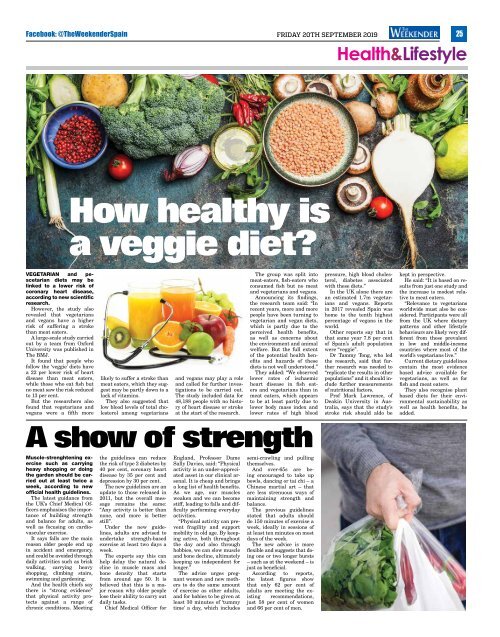You also want an ePaper? Increase the reach of your titles
YUMPU automatically turns print PDFs into web optimized ePapers that Google loves.
Facebook: @The<strong>Weekender</strong>Spain<br />
FRIDAY 20TH SEPTEMBER 2019 25<br />
Health&Lifestyle<br />
How healthy is<br />
a veggie diet?<br />
VEGETARIAN and pescetarian<br />
diets may be<br />
linked to a lower risk of<br />
coronary heart disease,<br />
according to new scientific<br />
research.<br />
However, the study also<br />
revealed that vegetarians<br />
and vegans have a higher<br />
risk of suffering a stroke<br />
than meat eaters.<br />
A large-scale study carried<br />
out by a team from Oxford<br />
University was published in<br />
The BMJ.<br />
It found that people who<br />
follow the ‘veggie’ diets have<br />
a 22 per lower risk of heart<br />
disease than meat eaters,<br />
while those who eat fish but<br />
no meat saw the risk reduced<br />
to 13 per cent.<br />
But the researchers also<br />
found that vegetarians and<br />
vegans were a fifth more<br />
likely to suffer a stroke than<br />
meat eaters, which they suggest<br />
may be partly down to a<br />
lack of vitamins.<br />
They also suggested that<br />
low blood levels of total cholesterol<br />
among vegetarians<br />
and vegans may play a role<br />
and called for further investigations<br />
to be carried out.<br />
The study included data for<br />
48,188 people with no history<br />
of heart disease or stroke<br />
at the start of the research.<br />
The group was split into<br />
meat-eaters, fish-eaters who<br />
consumed fish but no meat<br />
and vegetarians and vegans.<br />
Announcing its findings,<br />
the research team said: “In<br />
recent years, more and more<br />
people have been turning to<br />
vegetarian and vegan diets,<br />
which is partly due to the<br />
perceived health benefits,<br />
as well as concerns about<br />
the environment and animal<br />
welfare. But the full extent<br />
of the potential health benefits<br />
and hazards of these<br />
diets is not well understood.”<br />
They added: “We observed<br />
lower rates of ischaemic<br />
heart disease in fish eaters<br />
and vegetarians than in<br />
meat eaters, which appears<br />
to be at least partly due to<br />
lower body mass index and<br />
lower rates of high blood<br />
pressure, high blood cholesterol,<br />
diabetes associated<br />
with these diets.”<br />
In the UK alone there are<br />
an estimated 1.7m vegetarians<br />
and vegans. Reports<br />
in 2017 revealed Spain was<br />
home to the tenth highest<br />
percentage of vegans in the<br />
world.<br />
Other reports say that in<br />
that same year 7.8 per cent<br />
of Spain’s adult population<br />
were “veggie”.<br />
Dr Tammy Tong, who led<br />
the research, said that further<br />
research was needed to<br />
“replicate the results in other<br />
populations” and it should include<br />
further measurements<br />
of nutritional factors.<br />
Prof Mark Lawrence, of<br />
Deakin University in Australia,<br />
says that the study’s<br />
stroke risk should aldo be<br />
kept in perspective.<br />
He said: “It is based on results<br />
from just one study and<br />
the increase is modest relative<br />
to meat eaters.<br />
“Relevance to vegetarians<br />
worldwide must also be considered.<br />
Participants were all<br />
from the UK where dietary<br />
patterns and other lifestyle<br />
behaviours are likely very different<br />
from those prevalent<br />
in low and middle-income<br />
countries where most of the<br />
world’s vegetarians live.”<br />
Current dietary guidelines<br />
contain the most evidence<br />
based advice available for<br />
vegetarians, as well as for<br />
fish and meat eaters.<br />
They also recognise plant<br />
based diets for their environmental<br />
sustainability as<br />
well as health benefits, he<br />
added.<br />
A show of strength<br />
Muscle-strenghtening exercise<br />
such as carrying<br />
heavy shopping or doing<br />
the garden should be carried<br />
out at least twice a<br />
week, according to new<br />
official health guidelines.<br />
The latest guidance from<br />
the UK’s Chief Medical Officers<br />
emphasises the importance<br />
of building strength<br />
and balance for adults, as<br />
well as focusing on cardiovascular<br />
exercise.<br />
It says falls are the main<br />
reason older people end up<br />
in accident and emergency,<br />
and could be avoided through<br />
daily activities such as brisk<br />
walking, carrying heavy<br />
shopping, climbing stairs,<br />
swimming and gardening.<br />
And the health chiefs say<br />
there is “strong evidence”<br />
that physical activity protects<br />
against a range of<br />
chronic conditions. Meeting<br />
the guidelines can reduce<br />
the risk of type 2 diabetes by<br />
40 per cent, coronary heart<br />
disease by 35 per cent and<br />
depression by 30 per cent.<br />
The new guidelines are an<br />
update to those released in<br />
2011, but the overall message<br />
remains the same:<br />
“Any activity is better than<br />
none, and more is better<br />
still”.<br />
Under the new guidelines,<br />
adults are advised to<br />
undertake strength-based<br />
exercise at least two days a<br />
week.<br />
The experts say this can<br />
help delay the natural decline<br />
in muscle mass and<br />
bone density that starts<br />
from around age 50. It is<br />
believed that this is a major<br />
reason why older people<br />
lose their ability to carry out<br />
daily tasks.<br />
Chief Medical Officer for<br />
England, Professor Dame<br />
Sally Davies, said: “Physical<br />
activity is an under-appreciated<br />
asset in our clinical arsenal.<br />
It is cheap and brings<br />
a long list of health benefits.<br />
As we age, our muscles<br />
weaken and we can become<br />
stiff, leading to falls and difficulty<br />
performing everyday<br />
activities.<br />
“Physical activity can prevent<br />
fragility and support<br />
mobility in old age. By keeping<br />
active, both throughout<br />
the day and also through<br />
hobbies, we can slow muscle<br />
and bone decline, ultimately<br />
keeping us independent for<br />
longer.”<br />
The advice urges pregnant<br />
women and new mothers<br />
to do the same amount<br />
of exercise as other adults,<br />
and for babies to be given at<br />
least 30 minutes of ‘tummy<br />
time’ a day, which includes<br />
semi-crawling and pulling<br />
themselves.<br />
And over-65s are being<br />
encouraged to take up<br />
bowls, dancing or tai chi – a<br />
Chinese martial art – that<br />
are less strenuous ways of<br />
maintaining strength and<br />
balance.<br />
The previous guidelines<br />
stated that adults should<br />
do 150 minutes of exercise a<br />
week, ideally in sessions of<br />
at least ten minutes on most<br />
days of the week.<br />
The new advice is more<br />
flexible and suggests that doing<br />
one or two longer bursts<br />
– such as at the weekend – is<br />
just as beneficial.<br />
According to reports,<br />
the latest figures show<br />
that only 62 per cent of<br />
adults are meeting the existing<br />
recommendations,<br />
just 58 per cent of women<br />
and 66 per cent of men.

















